One conversation with rapper Rick Ross will have you questioning the definitions of success, wealth and opportunity; how to identify opportunity, how to achieve success and how to maintain it while keeping your soul and bodily faculties intact.
Ross, born William Leonard Roberts II, rose to prominence in 2006 with his breakout single, Hustlin’, a word that defines his character and approach towards life. Though Ross doesn’t speak like a scholar, his wisdom permeates our conversation. He is an alchemist; aware of his power to transmute base metals to gold. Rick Ross’ fans are believers in his use of language, and his unabashed celebration of riches. He’s proud to remind people that he created a palatial oasis out of the urban desert that was his early life.
Where many others in the Carol City district of Miami where Ross grew up saw few options, Ross saw the opportunity to translate his experiences into music. He came on the scene as hip hop left its golden era behind in favor of corporate commercialism, and then helped to usher in a rap renaissance of which he has become one of the genre’s most powerful voices.
The way Rick Ross explains it to me, the flash and cash his lifestyle portrays goes deeper than flagrant materialism. It leaves a roadmap for others behind him to follow – from no way out to a yellow brick road of possibilities. Even Ross’ palatial Georgia residence can be dubbed rap’s incarnation of The White House, with A-listers paying homage to the famous property (once owned by Evander Holyfield) on occasion.
With 87 singles under his belt, Rick Ross moves through the music business with the urgency of being on borrowed time. Not since the late Tupac Shakur has an artist been quite so cognizant of, nor vocal about, his own mortality, and for good reason. Witnessing the loss of life has been a constant for Ross since his childhood. In recent years Ross survived a grisly drive-by shooting and multiple life-threatening seizures. He’s emerged more prolific than ever with his tenth studio album, Port of Miami 2 and the release of his new book, Hurricanes: A Memoir.
From sleeping in his car in the early 2000s while doggedly pursuing the American dream, to holding tremendous clout among the most successful artists of the moment, Port of Miami 2 features guest appearances by Swizz Beatz, Meek Mill, the late Nipsey Hussle, John Legend, Lil Wayne and Drake. The relationship between Rick Ross and Drake goes back nearly a decade, when Ross showed tremendous support for Drake’s career after the release of his early work, with the breakout mixtape So Far Gone. The two have been allies and collaborators since.
The focus of our conversation was Ross’ memoir, Hurricanes, and the rags to riches story he loves to illustrate for his fans.

Photos Courtesy of Bob Metelus. Creative Consultant: Sheldon Wright
Allison Kugel: You come across as nostalgic in your memoir, Hurricanes. If you could travel through time and bear witness to the making of any classic album, which one would you love to be a part of?
Rick Ross: A rap album? That would have to be Paid In Full with Eric B. and Rakim. Rakim was such a supreme lyricist and B. was the epitome of a DJ/dope boy. They were the center of style and fashion with their Gucci suits on the album covers, sitting on the hood of a Mercedes Benz S550. It was the epitome of what rap music really represented.
Allison Kugel: Generational wealth or artistic legacy… which means more to you?
Rick Ross: Generational wealth, without a doubt.

Photos Courtesy of Bob Metelus. Creative Consultant: Sheldon Wright
Allison Kugel: You’ve had some close calls between your health issues and an attempt that was made on your life. What was the greatest lesson or insight gained from those experiences?
Rick Ross: Ha! Something just ran across my mind, and I want to say that if it was the end, I would want to make sure I smoke all the roaches down until they’re by my fingertips (laughs)! But it boils down to appreciating and enjoying every day.
Allison Kugel: Do you believe in destiny, free will, or both?
Rick Ross: Destiny, for many different reasons. When there was [sic] 20 shots fired at my Rolls Royce, I had the audacity to go back and get my Cuban link chain. Not only did I go back to get my Cuban link chain, I went back to go get my girlfriend. It had to be destiny.
Allison Kugel; It’s nice that you went back for your girlfriend but thank God you didn’t lose the Cuban link (laughs). Kidding!
Rick Ross: (Laughs)
Allison Kugel: What is the source of your drive and ambition?
Rick Ross: Other than my DNA, it comes from my neighborhood, and being so blatantly aware of the haves and the have nots. I knew I was one of the [have nots]. It may not have been traumatic at all. It could have been something as simple as me not having the Nintendo with the Mike Tyson Punchout game.
Allison Kugel: That was my favorite game! You’re taking me back…
Rick Ross: Mine too. Mike Tyson Punchout and Double Dragon. When you’re the one on the block, where your friends have to bring the game and cartridges in a Winn Dixie bag to come spend the night at your crib, you kind of know.

Photos Courtesy of Bob Metelus. Creative Consultant: Sheldon Wright
Allison Kugel: Do you pray? And who or what do you pray to, and what do you pray for?
Rick Ross: Daily. I call him The Big Homie because there’s only one Big Homie; I don’t care what nobody else calls him. I just let Him know I’m appreciative of everything, and I’m really under his command. The second he calls for me or is ready for me, I’m going to open my arms to him.
Allison Kugel: What are you here in this life as Rick Ross to learn and to teach?
Rick Ross: Just that others like me, who never learned math, that you can still be the CEO, you can still become authors and artists. Nobody ever told me that. I had to learn that on my own. When I was in school, I sat in the back of the class making jokes, trying to cover up the fact that I never learned multiplication or algebra.
I want to let youngsters who are in the position I was in, know that they can be in this position I’m in now. My father wasn’t there to tell me that, and I never had a big brother. The people I looked at were the ones in the street. I know the advice I always got from them, but I want to teach others that you can become a CEO, a huge success. I’m not only the CEO of one company, but close to a dozen. That’s what I want to be able to teach people on a major scale.
Allison Kugel: To divert a bit, let’s talk about a song from your recent album, Port of Miami 2, Gold Roses featuring Drake. It’s a great song. Describe the dynamic between you and Drake, musically and personally.
Rick Ross: Drake is a genuine human being, and I think that is what I admire and respect about him so much. The role I’ve always played with him was Big Homie, and he always played my Lil’ Homie. That dynamic has always been as natural as it comes, and that’s when we’re in the recording booth and when we’re outside the recording booth. He’s not afraid to show his sensitive side, and that’s what makes him the artist he is.
Allison Kugel: You’ve been quoted as saying that you never question God. Even in your darkest moments, you’ve never asked, “Why?” or questioned Him in any way?
Rick Ross: If I have, it was many years ago before I began to understand what life is. Life can be a cruel place; it can be a cold place. But it also can be as beautiful as you make it. I didn’t even question Him on the morning I woke up with my closest friend dead in the room next to me. We had just been together three hours earlier, and now three hours later, he’s dead and gone (Ross recounts this story in his book, Hurricanes: A Memoir/Hanover Square Press). I never questioned when my other closest homeboy was gunned down in a home invasion in front of his two, three and four-year-old sons. I’m not going to question the Big Homie. Whatever his plans are, that’s his plans. However I go out, it’s destiny.
Allison Kugel: Have you ever stopped to reflect on, and question, the violence that’s surrounded you throughout your life?
Rick Ross: Growing up where I grew up, I never questioned it because questioning it did nothing for it. Hearing AK-47s going off for sixty seconds at a time, you can cry, you can pray, you can question it, but you better just sit back, shut the fuck up, and wait for the ambulance to come. Year after year of seeing and hearing it and walking to school while passing a dead body, it gets to a point where you don’t question it. You got to decide, am I going to survive or am I going to die?
Allison Kugel: You discuss your solid financial prowess in your book. What do you teach your children about money?
Rick Ross: The disadvantage my children have is that they’re my kids, and my entire family is in a different position. They’re receiving money from everybody. I could put my kids on an allowance, but my daughters have credit cards. I do explain the importance and the value of building a brand. I don’t speak to my daughter about coming up from the mud to the marble and starting with nothing, because that’s not her life. She’s not in the position me and my sisters were in.
Instead, I talk to her about the importance of maintaining our brands and bringing something new to the brand. By the time she was fourteen, my daughter knew how to run a Wingstop (one of Ross’ several business interests). If we left her in a Wingstop [restaurant] with two other people, they would be able to run it for a full day. With my haircare line, RICH Haircare (RICH by Rick Ross), I allow her to be in the conference calls and to sit in on the meetings. At the same time, she gets to live and enjoy life much more than I did at her age. You have to take the good with the bad, but I most definitely let them see firsthand what hard work is.

Photos Courtesy of Bob Metelus. Creative Consultant: Sheldon Wright
Allison Kugel: You’re raising your kids in the Holyfield Mansion (Ross’ 44,000 sq. ft. Georgian estate, once owned by Evander Holyfield). I would imagine there has to be a sense of entitlement when your kids are growing up in what is, for all intents and purposes, a palace.
Rick Ross: It’s not something I overthink. As parents, we need to set examples because we have to let our children grow into what and who they are going to be. I really don’t put a lot of pressure on my kids, because they’re good students and they are very respectful of me and of everyone else around them.
I’m allowing them to become young adults, and to decide what college they want to go to, what they want to be, what they want to do, how they want to do it, and where they want to do it. I’m pretty free about that. But it’s true. It’s not an upbringing I would know about firsthand, and I’m pretty sure I would feel entitled if Eddie Murphy was walking around my dad’s home and Coming to America 2 was being filmed at my father’s estate. They’re filming Coming to America 2 at the estate right now.
Allison Kugel: Okay, well that’s awesome! Are you in it?
Rick Ross: I have a small role and I did my first scene a few days ago.
Allison Kugel: I’ll have to look out for you when it comes out.
Rick Ross: Most definitely. You’ll have to look out for Rozay in the movie when it’s out (laughs).
Allison Kugel: I love how in the back of your book you thanked a jeweler who let you browse his watch collection for hours and ask him a bunch of questions years ago, when he knew you couldn’t afford to buy one. Do you think you envisioned your dreams into existence?
Rick Ross: Without a doubt. I think that’s a part of destiny. I believe that if you believe in something or anticipate something coming to you, you try your best to prepare for it. For example, I’m trying my best now to prepare to be a huge actor one day. Before I finished my book, I wanted to thank Mr. Morgan; that was the name of the jeweler. He was extremely kind and patient with me. For some reason he would always let me, for two hours at a time, look and ask questions about the jewelry. He knew I didn’t have money. I probably didn’t have money for a damn soda at that time. He’d take the time to describe the different watches to me, and my mind was just blown. I was fascinated by the idea of having jewelry. He would let me stand there for a long time and I never got the opportunity to purchase anything from him. I just wish he knew who I was, and I wish I knew where he was now, because I would personally want to thank him.
Allison Kugel: How do you feel about your fans getting to know you on a more intimate level when they read your book? Does that make you nervous or excited?
Rick Ross: I would never be nervous at the idea of my fans getting to know me, and I feel like if they really knew who I was, they wouldn’t even believe me. The book paints some pictures for you but can never really give you an idea of what the real play was, because I came up in the era of some real things happening. Neil [Martinez-Belkin] did a great job of putting the book together. He spoke to maybe 60 or 70 of my closest friends and family, because talking to me there’s only some much conversation I’m going to give you. The shit I’ve seen, when we talked, it got no realer. When I talked about getting real money it got no realer. That’s what made me the businessman I am. Unlike a lot of other artists, I was familiar with money before the music came. Most artists, by the time they get their first advance, they got to go get a car or a home. I already had these things, so by the time I got money in the music business I was ready to invest in other things and do other things.
Allison Kugel: At the end of your book, you also pay tribute to the late Nipsey Hussle. Why do you think his life ended the way it did and when it did?
Rick Ross: As painful as it is to watch this type of shit online (referring to surveillance video footage of the shooting), that’s what I grew up seeing. As painful as it is, I almost became numb to it over the years. I’ve always been the one that’s been the shoulder for others to cry on. Why did it happen? I can’t answer that. Was he a special individual? An incredibly special individual!
Would I still consider Nipsey Hussle blessed and highly favored? Yes, I would. I’ve stood in those shoes before, and I was blessed to walk away. But for some reason, if it was to happen to me and that’s how the Big Homie upstairs chose for me to go, I’m going to open my arms to him. I don’t fear death, personally. I’m sure if Nipsey was here, Nipsey would still love and support his community the same way. Would Nipsey still love flossing in Crenshaw? I believe so. I would still love Miami 305, even if that was the city that took my life.

Photos Courtesy of Bob Metelus. Creative Consultant: Sheldon Wright
Allison Kugel: What do you hope fans are getting out of reading your book?
Rick Ross: I just hope the youngsters that are from where I’m from can see the potential in them in becoming authors, becoming CEOS or whatever they want to become. Do I really think I’m going to make money off this bullshit? Probably not. Do I think it will be successful? Really, anything with my face on it could be successful, but I didn’t do it for that. I wrote the book because I’m another youngster from a failing situation that’s seeing some success. Ultimately, that’s what it’s about. Going from being the hunted to becoming the hunter.
Hurricanes: A Memoir by Rick Ross with Neil Martinez-Belkin is available on Amazon and wherever books are sold. Port of Miami 2, Ross’ 10th studio album, is out now. Follow him on Instagram @RichForever.

TV
Did JD from Scrubs Have a Dark Past?

TW: Discussions of child abuse and neglect.
The sitcom Scrubs ran from 2001- 2010 delighting viewers with the escapades of daydreaming Dr ‘JD’ Dorian and his friends. Unlike most TV sitcoms Scrubs perfectly balanced the comedic and the tragic. Being set in a teaching hospital with most of the main cast being doctors; there was plenty of fodder for some truly heart-wrenching storylines.
Like with most sitcoms, if you look under the jolly veneer (and have too much time on your hands) a much darker story emerges. In Scrubs, I would argue, this may be the past of its titular protagonist JD (played by Zach Braff). Some fans (ok, me) speculate that not only did JD have a less than ideal childhood but an abusive one.
Hints of this could be interpretated throughout the series:-
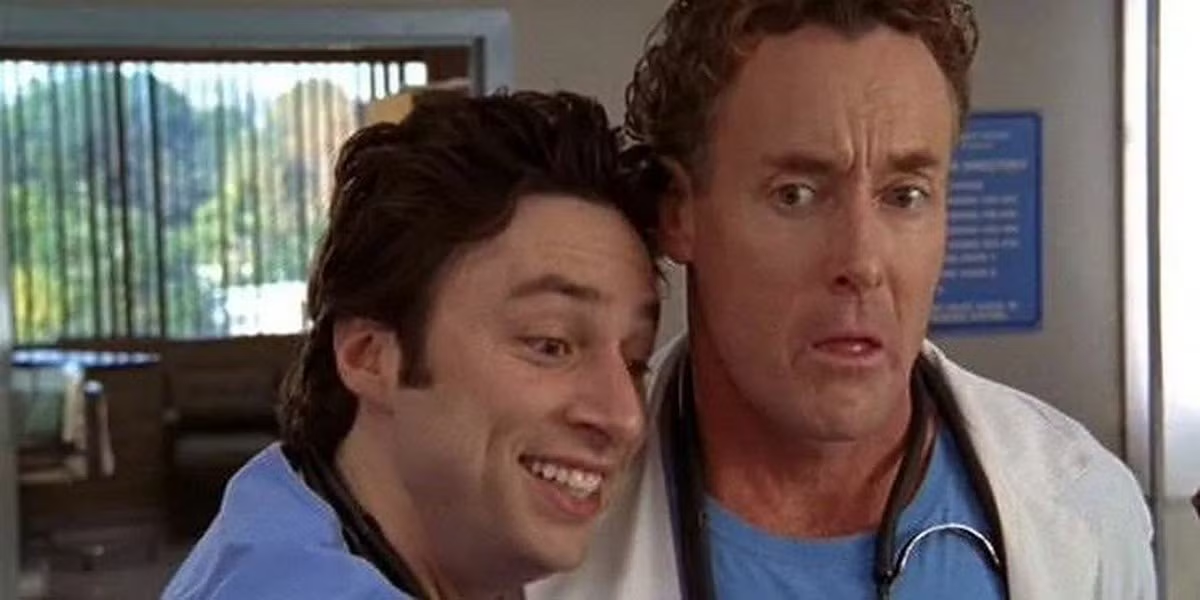
1. Attachment to Dr Cox
One of the most popular aspects of the series is the oddly touching relationship between mentor and mentee: Dr Cox (John C McGinley) and JD. It’s perfectly normal to admire and want to emulate an older colleague. But JD’s admiration of Dr Cox always seemed to go a step further. JD looked to the older doc as not only a mentor but a father figure.
JD explicitly states this throughout the series. Most notably in the finale; when during his much sought after hug JD claims Dr Cox smells “like a father figure”. This is odd as Dr Cox is only about 13 years JD’s senior. We know JD’s biological father (played by the late John Ritter) was pretty much absent during JD’s childhood. Is this yearning for a parental figure a way to fix JD’s damaged childhood?
As loathe as I am to criticise a fan favourite but Dr Cox openly mocks and belittles JD, almost never referring to his protégé by name. Instead by a vast archive of disparaging nicknames. The show does establish that there is love and respect om both sides, from Dr Cox deep down (deep, deep down). But why does JD not only put up with as well as seek out this treatment? Very masochistic. Or, has JD been subconsciously taught that taunts and aggression equate to love?

2. Feels Affinity with Dr Cox and Elliot
The show establishes early on that Dr Cox had an abusive homelife as a child. He openly reminisces about his parents being violent alcoholics. Is this the real reason that JD clamours for Dr Cox’s attention? Does JD see Dr Cox as an inspiration of someone who came from a similar background to his and became a well-respected doctor and family man?
Is the same true of JD’s on/off girlfriend, future wife and fellow doctor; Elliot? The show establishes that Elliot’s parents are mentally, emotionally, and financially abusive. Are JD and Elliot drawn to one another (partly) because they are both traumatised by their past? Even when it is proven time and time again that they are not suited.

3. Hostile Relationship with Older Brother
JD’s older brother Dan (Tom Cavanagh) appears several times in the show. Despite regularly visiting his kid brother, JD makes clear that these visits are not welcomed. JD’s ire is uncharacteristic as he’s shown as an ardent people pleaser throughout the show. Yes, Dan did bully JD throughout their childhood, though it’s unclear whether this was normal sibling rivalry or more.
In Series 3 Episode 5 ‘My Brother, Where Art Thou?’ JD attempts to cut off contact with Dan claiming that Dan never looked out for him. Even as children of divorce why is JD so upset his brother didn’t protect or “come through” for him? In the same scene JD comments about how their mother “married anyone that rang the doorbell”. Reading into this (hey, it’s what we’re here for) did Dan not protect JD from these multiple husbands?

4. Audience Never Actually See JD’s Mother
To me this is the most obvious that something is suspicious about the Dorian matriarch. Despite seeing every other cast members mother (except Dr Cox but its implied that his parents are dead) we never see JD’s. He, at the very least, seems to have a good relationship with his mother. Mostly speaks highly of her and she calls often. It doesn’t follow the trope many sitcoms use; having a character the audience never physically sees being used for comedic effect.
We hear JD’s mum (Barbara) speak in a flashback (Series 3 Episode 21 ‘My Self-Examination’). While Barbara was tucking young JD into bed she was saying some quite toxic things to her child, like how no women will ever be good enough for him. It is clear this scene is supposed to be somewhat creepy as Barbara is stroking the child’s face in an inappropriate manner. Adult JD even refers to his mum as “sexy” in the same episode. Very Freudian but in the light of everything else we are discussing: very disturbing!
5. JD’s Mother Drank
Linked to number 4 JD admits in Series 8 Episode 2 ‘My Last Words’ JD admits his mum “drank a lot”. Does this statement answer some questions about JD’s odd childhood?
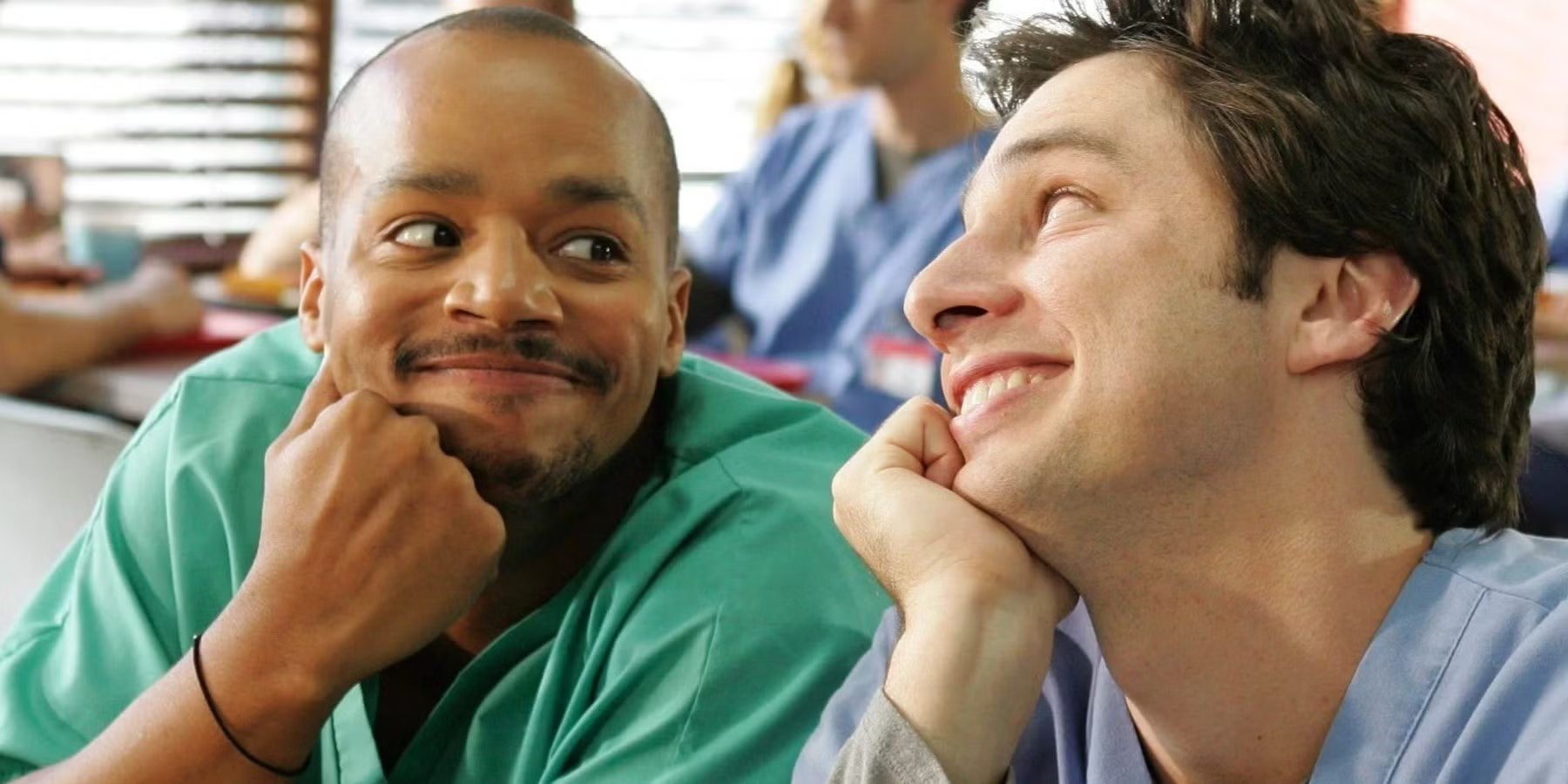
6. JD is a People Pleaser
As we have already mentioned JD is a pathological people pleaser (what’s that like?). As a doctor he goes above and beyond for his patients. He does everything from finding patients estranged family members (Series 4 Episode 11 ‘My Unicorn’) to shaving his head in solidarity with a chemo patient (Series 5 Episode 15 ‘My Extra Mile’). Of course this is all very commendable but JD particularly enjoys the gratitude. Why does he need this validation? Is this a coping mechanism from a turbulent background who had to go above and beyond to get the love that should have been unconditional?
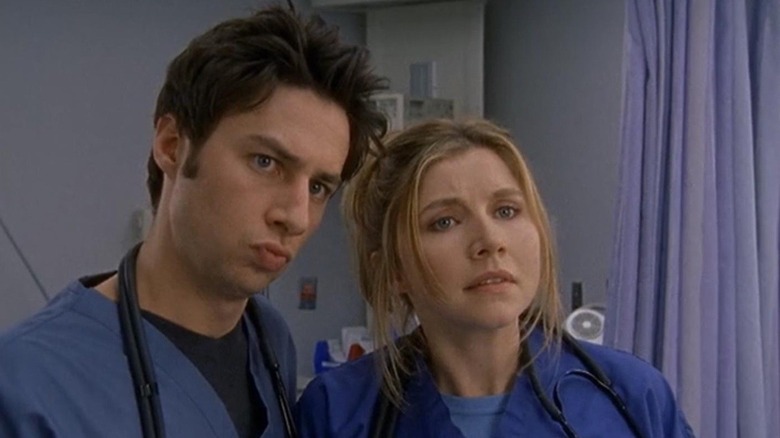
7. Extremely Tactile
Another of JD’s character traits is he extremely tactile. This is of course played up for comedy with his ‘sneak hugs’ (Series 6 Episode 13 ‘My Scrubs’) delivered to the stand-offish Dr Cox or the fact he has his friends on a ‘hugging schedule’ (Series 5 Episode 8 ‘My Big Bird’). Is this someone trying to seek the love and affection he never received in childhood? Or reassure himself that the people he loves won’t disappear?
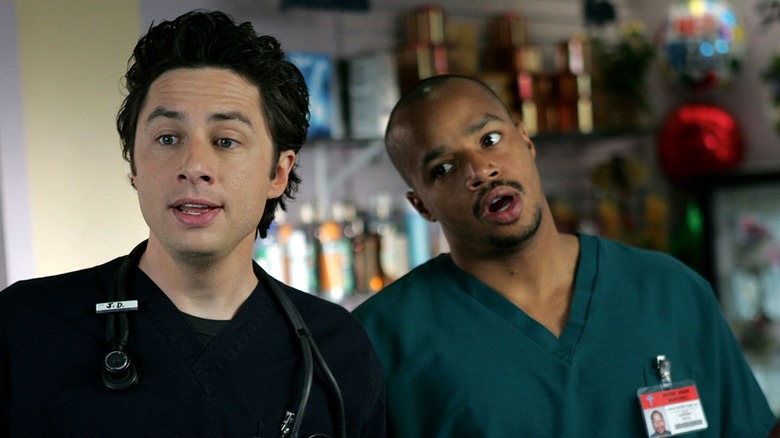
8. Self-Sabotaging
A common reaction to childhood trauma is self-sabotaging behaviour. In his romantic relationships JD has this in spades. Throughout the run of the show JD has more romantic partners than the rest of cast put together. It is acknowledged that JD goes from relationship to relationship with alarming speed and breaks them off for shallow reasons. Again, he may be trying to seek the love and security he never had in childhood.
JD’s damaged psyche is put on full display when after spending the majority of the series chasing Elliot she finally leaves her loving boyfriend for him. JD immediately decides he doesn’t want her anymore to many fans outrage (Series 3 Episode 20 ‘My Fault’).
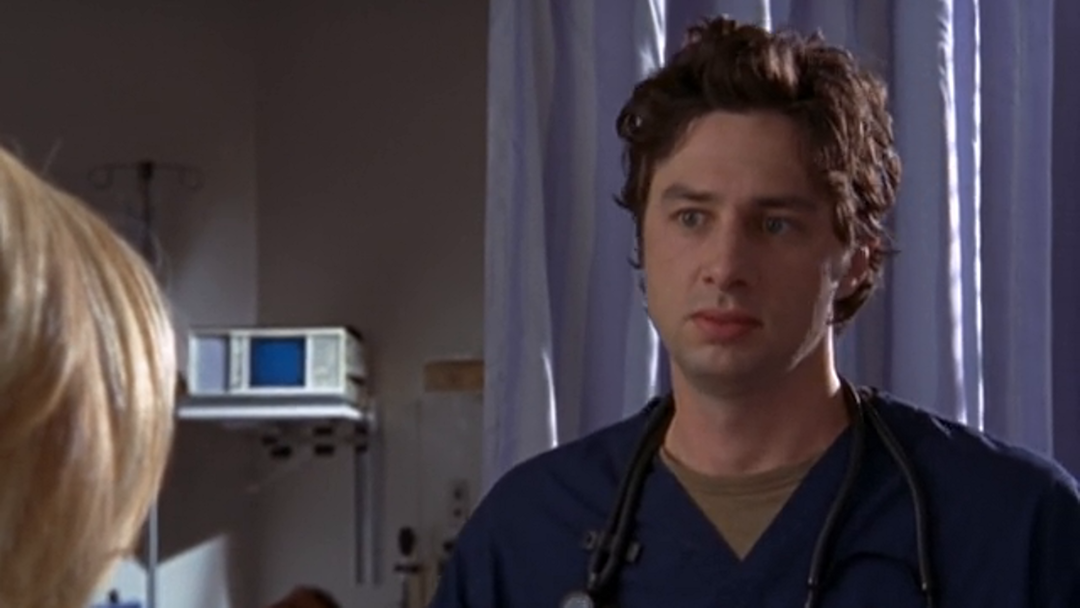
9. No Therapy
As well as never actually seeing his mother, we never see JD engaged in any kind of therapy. All of the other characters attend various types of therapy throughout the series. JD does not, despite arguably needing it the most. Is JD perhaps too scared of what therapy might uncover or not want to deal with his trauma head on?
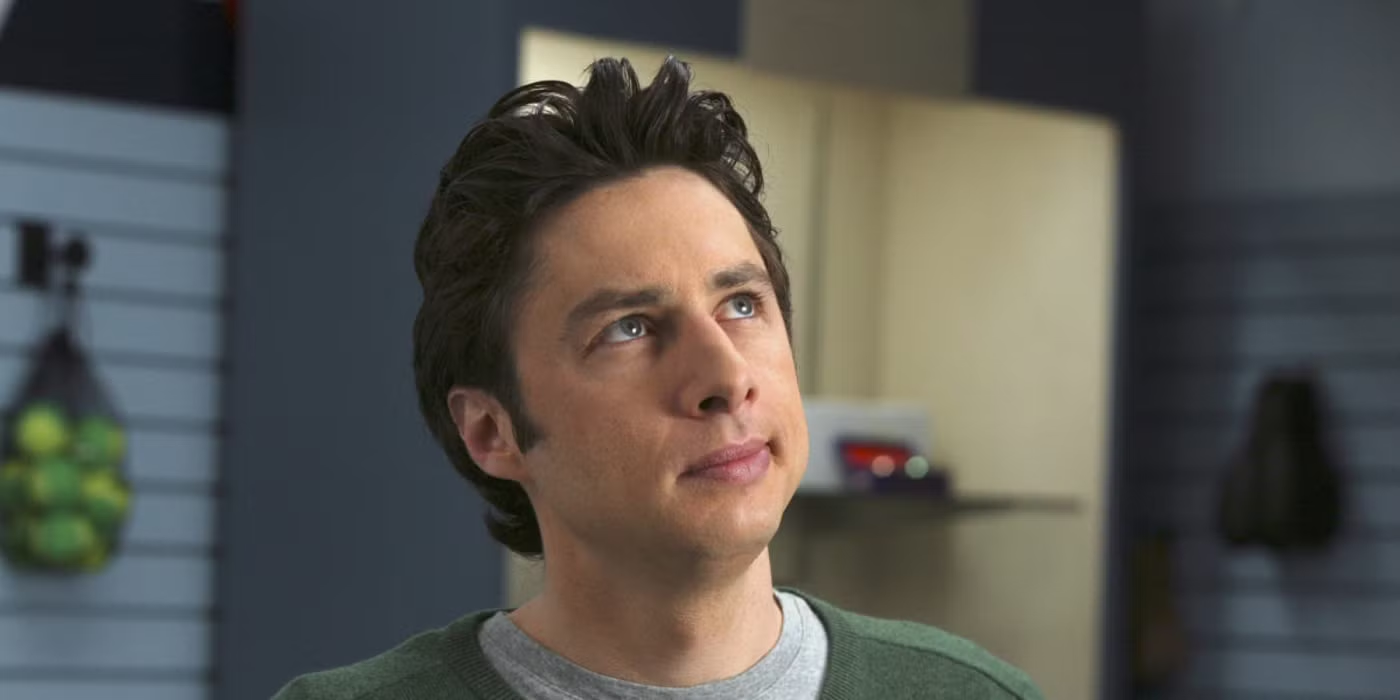
10. Overactive Imagination
During Scrubs entire run (except the final series thou shalt not be named) hinges on JD’s overactive imagination. His outlandish fantasies make for excellent comedy and unique sequiturs to break up the storylines. But what if this was yet another coping mechanism for the hapless leading man?
Children from challenging background often disappear into elaborate fantasy worlds in order to escape their surroundings. Is this a habit JD could never quite kick? It would explain why he doesn’t seem to have a lot of control of his daydreaming despite being an adult. It is a comfort and a way to deal with the difficult stuff life throws at him.
If any or all of these speculations are true Scrubs goes from being a mere half-hour sitcom to a story of one man’s triumph over his dark past. Despite his flaws and failings JD has still made something of himself and is surrounded by his chosen family; all of whom love him for who he is. This is extremely inspiring.
Movie
‘Mufasa: The Lion King’ Will Leave You Breathless

“Mufasa: The Lion King” is a visually stunning addition to the beloved Lion King franchise, offering a fresh and emotionally resonant take on the origins of one of Disney’s most iconic characters. The film beautifully explores Mufasa’s journey, balancing heartfelt moments with touches of comedy that lighten the mood and make the story accessible to audiences of all ages. The animation is breathtaking, capturing the vibrant landscapes and lush environments of the Pride Lands, adding depth to Mufasa’s character and his relationships.
The storytelling is compelling, effectively pulling at the heartstrings while providing insights into Mufasa’s character before he becomes the legendary king. However, the setup for Scar’s betrayal feels somewhat underdeveloped, lacking the deeper motivation that could have enriched their complex brotherly relationship. This missed opportunity leaves a slight gap in understanding Scar’s actions, which could have elevated the dramatic stakes.
The musical score is impressive, featuring memorable songs that enhance the emotional impact of pivotal scenes. While there are several standout tracks, one song, in particular, resonates deeply and is sure to linger in viewers’ minds long after the credits roll. Overall, “Mufasa: The Lion King” is an amazing film and a worthy addition to the Lion King lore that manages to deliver both laughter and tears, offering a rich tapestry of storytelling that fans will appreciate.
Movie
Is ‘Kraven the Hunter’ a Total Letdown?

“Kraven the Hunter,” directed by J.C. Chandor, aims to introduce a beloved Spider-Man villain to the big screen, but unfortunately, it falls short of expectations. The film suffers from noticeable issues, notably an overuse of ADR (Automated Dialogue Replacement), which detracts from the authenticity of the characters’ interactions and contributes to an uneven audio experience. This technical flaw is compounded by rough storytelling that feels disjointed and lacking in coherence, leaving viewers struggling to connect with the narrative.
Aaron Taylor-Johnson delivers a commendable performance as Kraven, showcasing the character’s gritty nature and complex motivations. His portrayal has potential, and it’s evident that he could elevate the character far beyond what is presented with a stronger script and direction. However, the absence of Spider-Man, a central figure in Kraven’s lore, leaves a void that the film struggles to fill. Without this critical connection, the plot meanders and fails to create the tension or stakes that fans of the superhero genre crave.
Additionally, including Rhino as a villain feels like a missed opportunity; he is presented more as a gag character with limited screen time, undermining any sense of threat or depth. For the average moviegoer, “Kraven the Hunter” might entertain but ultimately feels like a mediocre viewing experience. Comic book fans, however, may find disappointment in this lackluster attempt to create a solo character film. Instead of an exhilarating dive into Kraven’s world, the film presents a watered-down version, leaving audiences wishing for a more cohesive vision that honors its comic book roots.


